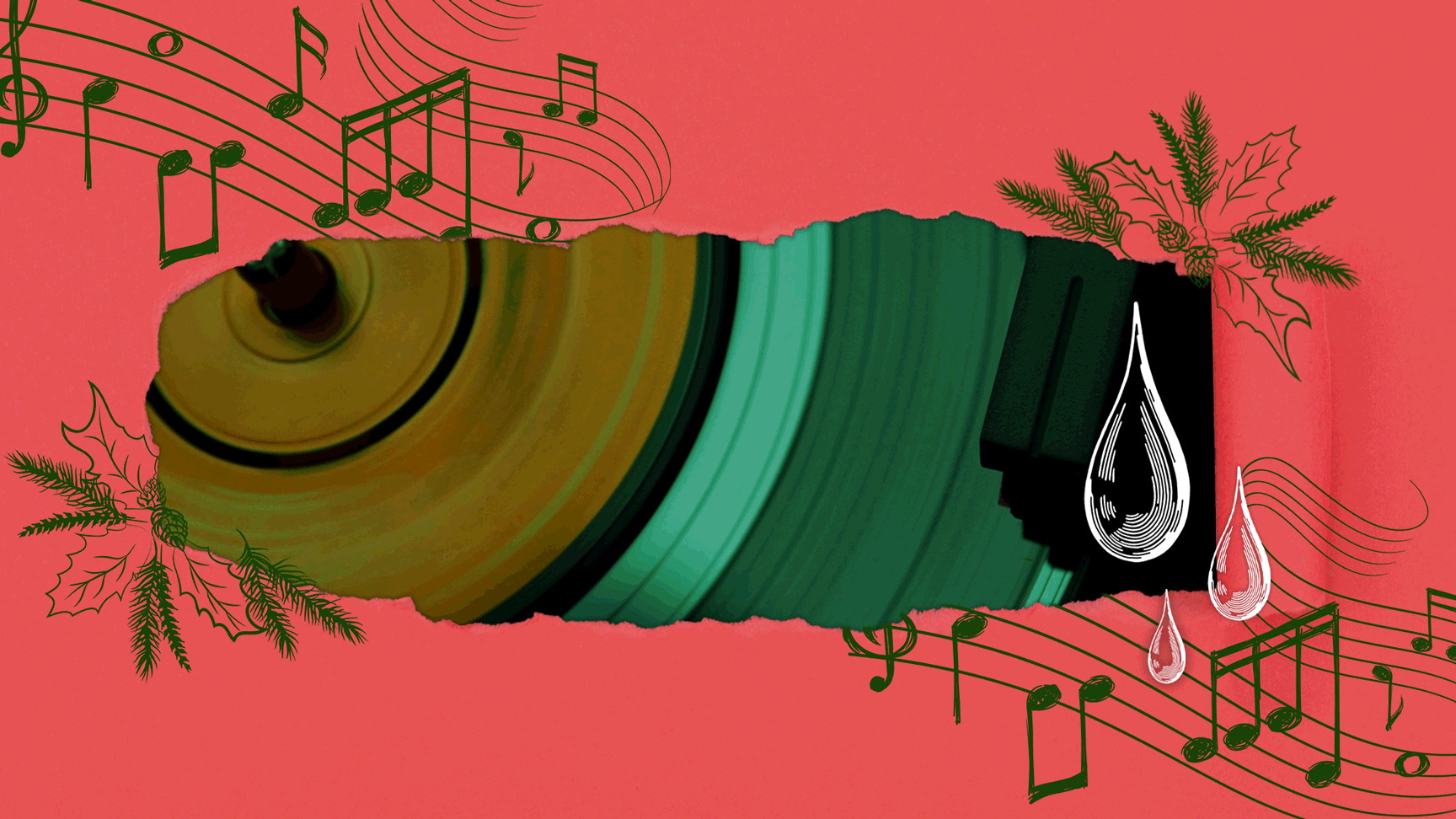Latinx Files: Learning to love Christmas again after years of loss

Hi folks, this is Fidel. Once in a while, I’ll ask someone to guest write the main story of the newsletter. This is one of those instances. I’ve asked my good friend Roberto José Andrade Franco to fill in. Roberto is a writer from El Paso. He is a National Magazine Award finalist, has been featured in “The Best American Sports Writing,” and wrote the oral history of the Chavez vs. De La Hoya fight, which you should read. He also believes menudo should be eaten with bolillos instead of tortillas, but don’t hold that against him. You can also find him on Twitter at @R_AndradeFranco.
“Mexican men are faster to cry the older they get.”
My mom would tell me something like that, in Spanish, each time my father, uncles, or older cousins cried during this time of year. She must have seen a confused look on my face when it happened. Because, and I’m not sure why, most times when it happened during Christmas Eve, it was men who were crying.
I used to love Christmas. I made some of my fondest childhood memories during this time of year when school let out and we’d return home for a couple of weeks. We lived in Colorado for a few years, driving back to Juárez during Christmas to reconnect with things we knew and the people we missed.
The Latinx experience chronicled
Get the Latinx Files newsletter for stories that capture the multitudes within our communities.
You may occasionally receive promotional content from the Los Angeles Times.
I’d split my time between my grandmothers’ homes in Juárez. They lived in the same neighborhood, just a street away from each other. So if I ever got bored at one home—or just didn’t like what they had to eat—I’d go to the other. But once Christmas Eve came, friends, family and neighbors would gather at my paternal grandmother’s house.
On that night, me and my cousins — who’d sometimes only see each other a few times a year — would play outside until the gun shots from celebration got louder and more frequent. Inside, there was dancing, drinking, eating, and laughing. There was singing and hugging which, when mixed with the right song, meant tears were coming.
I don’t enjoy Christmas anymore. Difficult to ignore how much things have changed so I struggle during this time of year. That my grandmother died around this time and part of the family died with her. That cousins — some younger, some around my age — aunts, and uncles unexpectedly passed and took another part of the family with them.
Maybe it was because they were the only way we knew how to celebrate, but we tried keeping the same traditions alive even after they were gone. But from year to year, it became easy to notice the posada song verses getting shorter and shorter. Just like, with my grandmother dying and us losing one more safe space to gather in Juárez, you can feel the gulf between our binational family get wider and wider. You could see the number of people there, getting candy after kissing the feet of the baby Jesus statue, shrinking smaller and smaller.
Last year, the celebration was as small as it’s ever been. My wife, daughter and I lived in North Texas, about a nine-hour drive from home, and spent Christmas alone. El Paso had become a national COVID hotspot. Things in Juárez weren’t any better. Surreal to watch the national news and feel so helpless. To watch death overwhelm the system so entirely that in El Paso, refrigerated trailers got used as a mobile morgue. There was nothing to celebrate last year since my cousin — who might as well have been my older brother — was among the hundreds of bodies inside those trailers. Instead of getting together, we all just stayed away.
For me, that’s one of the many odd things about living in the pandemic. That you eventually learn to exist within the panic that’s so consistent it’s ingrained itself to life. But it’s in the moments you used to celebrate together but can’t any longer, when all that’s been lost becomes clear. That this life isn’t what it was back when I remember seeing my father, uncles and older cousins, singing songs while surrounded by things they knew, which in its own way, reminded them of the very things they missed. Things that, for that night, they partly reclaimed through a memory brought on by a song.
I’m almost certain that’ll happen this year. I’ll hear a song — likely from Juan Gabriel or Vicente Fernandez — that’ll remind me of someone who now only lives in my memories and sporadic dreams. Songs that’ll make me think about who might be missing next Christmas and make my throat tighten. And maybe my mother will see that and, noticing a confused look on my daughter’s face, she’ll tell her the same thing she’d tell me on the night, each year, when I’d see grown men cry.
It’s hard but I’m trying to enjoy Christmas again. So that my 4-year old daughter’s childhood memories of this time of year are warm and happy just like mine were. We’ve all lost so much, maybe we can have that.
Consider subscribing to the Los Angeles Times
Your support helps us deliver the news that matters most. Become a subscriber.
Have yourself a merry little recalentado of Nochebuena stories.

Hey folks. Fidel again.
As many of you know, the actual Latinx Christmas falls on the night of Dec. 24, or Nochebuena. Ahead of the holiday last year, I asked friends, colleagues and readers to submit their favorite memories from the holiday. You can find those stories here.
Rereading them reminded me of how much better this newsletter is when we hear from you and how it’s something that I want to do more of in the new year. To get the ball rolling, and inspired by this tweet from Chicago journalist Carlos Ballesteros and my own Christmas trek to the place that made me (I’m writing this from a Starbucks in south San Antonio after driving for two days straight) , I want to hear your holiday road trip stories. Send them to me at latinxfiles@latimes.com.
Things we read this week that we think you should read
— ABC News is reporting that prosecutors in the case of Rogel Aguilera-Mederos have “filed a motion to start the reconsideration process” for his sentence. Aguilera-Mederos, a truck driver and Cuban immigrant, was sentenced last week to 110 years in prison over a 2019 deadly crash that killed four people. He claimed it was an accident and that his brakes gave out.
That ABC News story serves as a good primer for the specifics of the case and why the sentence was so harsh.
Aguilera-Mederos’ story went viral largely because of his gut-wrenching plea made before he was told he was going to spend the rest of his life in jail, and it inspired a Change.org petition with more than 4.7 million signatures asking for clemency. Just about the only people not upset about this are the prosecutors. One of them even got a plaque with a brake shoe to commemorate their win in court.
—An independent panel has redrawn California’s political map, and the result appears to give Latinx voters in the state more political clout— nearly one-third of the state’s 52 new congressional districts would be majority Latinx.
— Not everyone wins with the new map. L.A. Rep. Lucille Roybal-Allard, the first Mexican American woman elected to Congress, announced that she will retire at the end of her term after her district was essentially eliminated.
— 2021 is wrapping up, which means that we’re in “Best of of the Year” lists SZN. My colleague Suzy Exposito wrote about the biggest moments in Latin music this year, from Bad Bunny at Wrestlemania to Chente dying.
—It’s also coquito season, and friend of the newsletter Alejandra Ramos has this fantastic recipe to make your Nochebuena even more lit.
— Natalia E. Contreras of the Austin American-Statesman did a very brave (or foolish?) thing and dove into the only linguistic debate that matters. No, not Latinx vs. Latino. I’m talking about tamal vs. tamale.
And now for something different...

)
Sol Cotti is an illustrator from Buenos Aires, Argentina. She likes to tell visual and fresh stories using a bold, simple and loose style mixing linework and fully fleshed illustrations.
“Unlike the United States, in South America it is very hot on holidays. People usually celebrate outdoors in patios and terraces. I think that Papa Noel would rather be on a beach having a cold beer while his reindeer surfs instead of having to wear a sweaty and hot costume. But traditions are of no value on their own.”
Are you a Latinx artist? We want your help telling our stories. Send us your pitches for illustrations, comics, GIFs and more! Email our art director at martina.ibanezbaldor@latimes.com.
The Latinx experience chronicled
Get the Latinx Files newsletter for stories that capture the multitudes within our communities.
You may occasionally receive promotional content from the Los Angeles Times.



